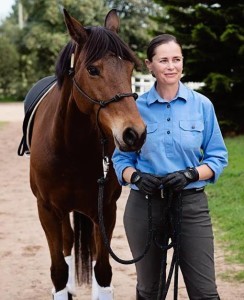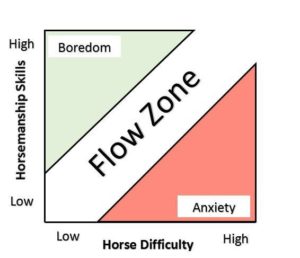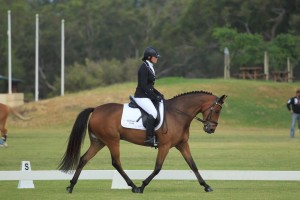 Thanks to Shelley Appleton for this guest blog post.
Thanks to Shelley Appleton for this guest blog post.
Appleton is a lecturer at the School of Pharmacy at Curtin University in Bentley, Australia, a dressage rider, and horse training coach.
Read her article on Emotion and Intellect in horsemanship.
Read her article on successful horsemanship learners.
She writes:
Have you ever wondered why you ride horses?
It’s time-consuming, difficult, expensive, and potentially dangerous. Even if we compete, the rewards in most horse sports are of little monetary value, nowhere near the compensation of time and effort. But still we do it!
Why? Most of us will say we “enjoy it.” But it can be stressful in so many ways and for so little obvious reward, that it appears to defy the usual things that people are motivated to invest time and effort in.
We are not being crazy.
 When we work with a horse we can enter a curious and fascinating conscious state. We become immersed with an energized focus and we experience the wonderfulness of being alive.
When we work with a horse we can enter a curious and fascinating conscious state. We become immersed with an energized focus and we experience the wonderfulness of being alive.
This state in the western world is known as “flow.” Concepts similar to flow have been discussed and written about in eastern religions of Hinduism, Buddhism, and Taoism. They describe states necessary for spiritual development.
Understanding yourself and your human nature can improve your ability to access flow and, correspondingly improve your horse work. We spend so much time focused on horses that we end up neglecting our own skill development, decision-making abilities, and flow consciousness.
So what is flow?
People experiencing flow commonly describe three characteristics:
- Intense and focused concentration on the present moment where actions and awareness become one and the little voice inside your head, your self-consciousness, self-doubt etc. is silent.
- A lack of anxiety about losing control. It is thought that this characteristic is one of the reasons why experiencing flow can be so enjoyable and rewarding. Your worries in life are silent.
- Altered sense of time. When we are in flow, we have little mental processes available to focus on time Typically, time seems to pass quickly.
But how can understanding flow improve our ability to work with horses?
Three key conditions for experiencing flow:
- Clear goals. Flow tends to occur when we have purpose and direction. This tends to channel our attention so we can structure the experience. Therefore, people need to have a clear understanding of what they are doing, how to do it, and why they are doing it.
- Balance between the challenge of the activity and one’s skills. Self-doubt and anxiety increases when the challenge exceeds a rider’s skills. Horses may sense the stress or have learned behaviors that increase their difficulty to be handled. Research shows that support and education can keep a person within their “flow zone.”An excellent way of improving skills, for example, is for an instructor to help improve a rider’s ability on the ground and then progress to riding.
- Feedback. One needs to be able to “see” the horse’s feedback and accurately evaluate it to know whether to maintain or alter their course of action. Again, education and support can help improve one’s ability to see and interpret feedback from the horse.
Ultimately, experiencing flow is about experiencing the sheer enjoyment of being alive and it happens in the space bounded by boredom and anxiety where there is a balance between your skills and the challenge.

Love this article!
It’s not always easy trying to find that balance where you’re pushing yourself out of your comfort zone enough so that you’re challenged and engaged and excited but not so much so that you’re overwhelmed, anxious and out of your depth – which is exactly as you say where flow falls.
Learning to connect with your horse and riding with that connection is definitely one way to get there.
Any particular practices that you’ve found to help develop and hone that sense of connection?